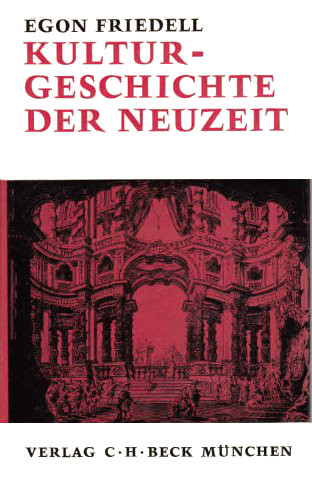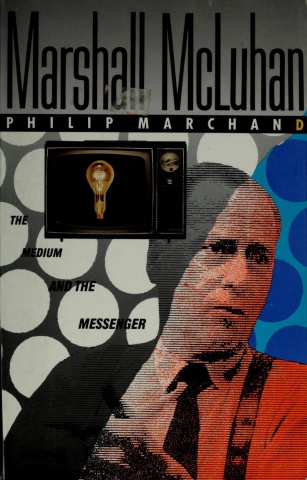Egon Friedell: A Cultural History of the Modern Age (1927–) [DE, EN]
Filed under book | Tags: · aesthetics, art history, cultural history, history, modernity, politics, religion

Austrian essayist, cabaret performer, and amateur cultural historian Egon Friedell is best known for his brilliant, playful, and stimulating magnum opus, A Cultural History of the Modern Age (1927-31), written under the influence of Oswald Spengler and Jacob Burckhardt. He hoped for a rebirth of Western culture; the Modern Age, which was born from the Great Plague of the fourteenth century, has come to its end. At the eve of World War II, Friedell committed suicide by jumping from a window of his apartment. The German writer Thomas Mann ranked Friedell as one of the greatest stylists of the German language.
A Cultural History of the Modern Age, inspired by H.G. Well’s The Outline of History (1920), is dedicated to Max Reinhardt. Its first volume deals with Renaissance and Reformation, the second Baroque, Enlightenment and the French Revolution, and the third part Romanticism, Liberalism, Imperialism, and Impressionism. Friedell’s view is subjective and intuitive – all history is saga and myth and it is nothing more than a difference in degree between historian and poet. “All the classifications man has ever devised are arbitrary, artificial, and false,” Friedell wrote, “but simple reflection also shows that such classifications are useful, indispensable, and above all unavoidable since they accord with an innate aspect of our thinking.” Following the Hegelian lines of though, Friedell sees his subject basically as a the process of spiritual history. Oswald Spengler’s (The Decline of the West, 1918-1922) pessimism and atheism he rejects. From the English writer, historian, and critic Thomas Carlyle (1795-1881) Friedell adopted the romantic “great man” theory of history, the hero-worship, totally ignoring its ominous connection with the political reality of his day. Every era and every generation has according to Friedell its own hero, a genius, who personifies the Zeitgeist, the spirit of the age. Nietzsche was for Friedell the epitome of the pre-WW I era. (from Petri Liukkonen’s short biography of Friedell)
German edition
Publisher Beck, Munich, 1927, 1928, 1931
This edition, Zweitausendeins, Frankfurt am Main, 2009, 1335 pages
English edition
Translated by Charles Francis Atkinson
With an Introductory Essay by Alfred Polgar
Publisher Alfred A. Knopf, 1930, 1931, 1932
Fifth printing, 1953 (Vol 1); Third printing, 1954 (Vol 2); First printing, 1932 (Vol 3)
353 + 457 + 489 pages
via hz40lat46
Review (of Vol 1, Crane Brinton, Speculum, 1953)
Review (of Vols 1-2, International Journal of Ethics, 1932)
Review (of Vol 2, Eli Siegel, Scribner’s Magazine, 1931)
Review (of Vol 3, Robert Briffault, Scribner’s Magazine, 1932)
Review (of Vol 1, C. Hartley Grattan, The Forum, 1930)
Review (of Vol 1, David Owen, The Saturday Review, 1930)
Review (of Vol 2, The Saturday Review, 1932)
Review (of Vol 3, Alfred M. Frankfurter, The Bookman, 1932)
Wikipedia (DE)
Kulturgeschichte der Neuzeit; Kulturgeschichte Ägyptens (German, 1927-31/2009, at Archive.org)
A Cultural History of the Modern Age, Volume I, Volume II, Volume III (English, trans. Charles Francis Atkinson, 1930-32, no OCR)
Philip Marchand: Marshall McLuhan: The Medium and the Messenger (1989)
Filed under book | Tags: · advertising, biography, communication, mass media, media, media theory, print, radio, religion, technology, television

He was described as “the greatest put-on artist of all time” and even as the greatest intellectual pioneer since Freud. Bouncing back and forth between the quiet University of Toronto campus and the glitzy world of the New York media, McLuhan was surely the most unlikely prophet of the sixties, yet his work underlies any serious discussion of the effects of media on our lives. (from the back cover)
Publisher Ticknor & Fields, New York, 1989
ISBN 0899194850
320 pages
Review (Christopher Lehmann-Haupt, The New York Times Books, 1989)
Review (E. Hamilton, Canadian Literature, 2001)
Review (Robert McKenzie, IPCT, 1994)
Review (William H. Melody, Information, Communication & Society, undated)
PDF (50 MB, no OCR)
Comment (0)Technologies of the Self: A Seminar with Michel Foucault (1988)
Filed under book | Tags: · antiquity, christianity, ethics, philosophy, philosophy of technology, power, psychoanalysis, religion, self, subjectivity, technology, truth, unconscious

A collection of essays based on a faculty seminar conducted and organised by the University of Vermont in the autumn of 1982. Contains an interview with Foucault made in October 1982, his six seminar presentations, a public lecture entitled “The Political Technology of Individuals”, and five presentations by members of the seminar.
Foucault’s presentations provide a concise overview of the conceptual and methodological shift that guided his “turn to the Greeks” in The History of Sexuality and his later seminars.
Edited by Luther H. Martin, Huck Gutman, Patrick H. Hutton
Publisher University of Massachusetts Press, 1988
ISBN 0870235931, 9780870235931
166 pages
Review (Montanus C. Milanzi, Systems Research and Behavioral Science, 2001)
Comment (0)
